#aws sagemaker developer
Explore tagged Tumblr posts
Text
Best AWS Sagemaker Developer
SoftmaxAI is a reputed AWS cloud consultant in India. We have the experience and knowledge to build comprehensive strategies and develop solutions that maximize your return on AWS investment. We have a certified team of AWS DeepLens, Amazon Forecast, PyTorch on AWS, and AWS Sagemaker developer to leverage machine tools and design custom algorithms and improve your ROI.
2 notes
·
View notes
Text
How Python Powers Scalable and Cost-Effective Cloud Solutions

Explore the role of Python in developing scalable and cost-effective cloud solutions. This guide covers Python's advantages in cloud computing, addresses potential challenges, and highlights real-world applications, providing insights into leveraging Python for efficient cloud development.
Introduction
In today's rapidly evolving digital landscape, businesses are increasingly leveraging cloud computing to enhance scalability, optimize costs, and drive innovation. Among the myriad of programming languages available, Python has emerged as a preferred choice for developing robust cloud solutions. Its simplicity, versatility, and extensive library support make it an ideal candidate for cloud-based applications.
In this comprehensive guide, we will delve into how Python empowers scalable and cost-effective cloud solutions, explore its advantages, address potential challenges, and highlight real-world applications.
Why Python is the Preferred Choice for Cloud Computing?
Python's popularity in cloud computing is driven by several factors, making it the preferred language for developing and managing cloud solutions. Here are some key reasons why Python stands out:
Simplicity and Readability: Python's clean and straightforward syntax allows developers to write and maintain code efficiently, reducing development time and costs.
Extensive Library Support: Python offers a rich set of libraries and frameworks like Django, Flask, and FastAPI for building cloud applications.
Seamless Integration with Cloud Services: Python is well-supported across major cloud platforms like AWS, Azure, and Google Cloud.
Automation and DevOps Friendly: Python supports infrastructure automation with tools like Ansible, Terraform, and Boto3.
Strong Community and Enterprise Adoption: Python has a massive global community that continuously improves and innovates cloud-related solutions.
How Python Enables Scalable Cloud Solutions?
Scalability is a critical factor in cloud computing, and Python provides multiple ways to achieve it:
1. Automation of Cloud Infrastructure
Python's compatibility with cloud service provider SDKs, such as AWS Boto3, Azure SDK for Python, and Google Cloud Client Library, enables developers to automate the provisioning and management of cloud resources efficiently.
2. Containerization and Orchestration
Python integrates seamlessly with Docker and Kubernetes, enabling businesses to deploy scalable containerized applications efficiently.
3. Cloud-Native Development
Frameworks like Flask, Django, and FastAPI support microservices architecture, allowing businesses to develop lightweight, scalable cloud applications.
4. Serverless Computing
Python's support for serverless platforms, including AWS Lambda, Azure Functions, and Google Cloud Functions, allows developers to build applications that automatically scale in response to demand, optimizing resource utilization and cost.
5. AI and Big Data Scalability
Python’s dominance in AI and data science makes it an ideal choice for cloud-based AI/ML services like AWS SageMaker, Google AI, and Azure Machine Learning.
Looking for expert Python developers to build scalable cloud solutions? Hire Python Developers now!
Advantages of Using Python for Cloud Computing
Cost Efficiency: Python’s compatibility with serverless computing and auto-scaling strategies minimizes cloud costs.
Faster Development: Python’s simplicity accelerates cloud application development, reducing time-to-market.
Cross-Platform Compatibility: Python runs seamlessly across different cloud platforms.
Security and Reliability: Python-based security tools help in encryption, authentication, and cloud monitoring.
Strong Community Support: Python developers worldwide contribute to continuous improvements, making it future-proof.
Challenges and Considerations
While Python offers many benefits, there are some challenges to consider:
Performance Limitations: Python is an interpreted language, which may not be as fast as compiled languages like Java or C++.
Memory Consumption: Python applications might require optimization to handle large-scale cloud workloads efficiently.
Learning Curve for Beginners: Though Python is simple, mastering cloud-specific frameworks requires time and expertise.
Python Libraries and Tools for Cloud Computing
Python’s ecosystem includes powerful libraries and tools tailored for cloud computing, such as:
Boto3: AWS SDK for Python, used for cloud automation.
Google Cloud Client Library: Helps interact with Google Cloud services.
Azure SDK for Python: Enables seamless integration with Microsoft Azure.
Apache Libcloud: Provides a unified interface for multiple cloud providers.
PyCaret: Simplifies machine learning deployment in cloud environments.
Real-World Applications of Python in Cloud Computing
1. Netflix - Scalable Streaming with Python
Netflix extensively uses Python for automation, data analysis, and managing cloud infrastructure, enabling seamless content delivery to millions of users.
2. Spotify - Cloud-Based Music Streaming
Spotify leverages Python for big data processing, recommendation algorithms, and cloud automation, ensuring high availability and scalability.
3. Reddit - Handling Massive Traffic
Reddit uses Python and AWS cloud solutions to manage heavy traffic while optimizing server costs efficiently.
Future of Python in Cloud Computing
The future of Python in cloud computing looks promising with emerging trends such as:
AI-Driven Cloud Automation: Python-powered AI and machine learning will drive intelligent cloud automation.
Edge Computing: Python will play a crucial role in processing data at the edge for IoT and real-time applications.
Hybrid and Multi-Cloud Strategies: Python’s flexibility will enable seamless integration across multiple cloud platforms.
Increased Adoption of Serverless Computing: More enterprises will adopt Python for cost-effective serverless applications.
Conclusion
Python's simplicity, versatility, and robust ecosystem make it a powerful tool for developing scalable and cost-effective cloud solutions. By leveraging Python's capabilities, businesses can enhance their cloud applications' performance, flexibility, and efficiency.
Ready to harness the power of Python for your cloud solutions? Explore our Python Development Services to discover how we can assist you in building scalable and efficient cloud applications.
FAQs
1. Why is Python used in cloud computing?
Python is widely used in cloud computing due to its simplicity, extensive libraries, and seamless integration with cloud platforms like AWS, Google Cloud, and Azure.
2. Is Python good for serverless computing?
Yes! Python works efficiently in serverless environments like AWS Lambda, Azure Functions, and Google Cloud Functions, making it an ideal choice for cost-effective, auto-scaling applications.
3. Which companies use Python for cloud solutions?
Major companies like Netflix, Spotify, Dropbox, and Reddit use Python for cloud automation, AI, and scalable infrastructure management.
4. How does Python help with cloud security?
Python offers robust security libraries like PyCryptodome and OpenSSL, enabling encryption, authentication, and cloud monitoring for secure cloud applications.
5. Can Python handle big data in the cloud?
Yes! Python supports big data processing with tools like Apache Spark, Pandas, and NumPy, making it suitable for data-driven cloud applications.
#Python development company#Python in Cloud Computing#Hire Python Developers#Python for Multi-Cloud Environments
2 notes
·
View notes
Text
The Future of AWS: Innovations, Challenges, and Opportunities
As we stand on the top of an increasingly digital and interconnected world, the role of cloud computing has never been more vital. At the forefront of this technological revolution stands Amazon Web Services (AWS), a A leader and an innovator in the field of cloud computing. AWS has not only transformed the way businesses operate but has also ignited a global shift towards cloud-centric solutions. Now, as we gaze into the horizon, it's time to dive into the future of AWS—a future marked by innovations, challenges, and boundless opportunities.

In this exploration, we will navigate through the evolving landscape of AWS, where every day brings new advancements, complex challenges, and a multitude of avenues for growth and success. This journey is a testament to the enduring spirit of innovation that propels AWS forward, the challenges it must overcome to maintain its leadership, and the vast array of opportunities it presents to businesses, developers, and tech enthusiasts alike.
Join us as we embark on a voyage into the future of AWS, where the cloud continues to shape our digital world, and where AWS stands as a beacon guiding us through this transformative era.
Constant Innovation: The AWS Edge
One of AWS's defining characteristics is its unwavering commitment to innovation. AWS has a history of introducing groundbreaking services and features that cater to the evolving needs of businesses. In the future, we can expect this commitment to innovation to reach new heights. AWS will likely continue to push the boundaries of cloud technology, delivering cutting-edge solutions to its users.
This dedication to innovation is particularly evident in AWS's investments in machine learning (ML) and artificial intelligence (AI). With services like Amazon SageMaker and AWS Deep Learning, AWS has democratized ML and AI, making these advanced technologies accessible to developers and businesses of all sizes. In the future, we can anticipate even more sophisticated ML and AI capabilities, empowering businesses to extract valuable insights and create intelligent applications.
Global Reach: Expanding the AWS Footprint
AWS's global infrastructure, comprising data centers in numerous regions worldwide, has been key in providing low-latency access and backup to customers globally. As the demand for cloud services continues to surge, AWS's expansion efforts are expected to persist. This means an even broader global presence, ensuring that AWS remains a reliable partner for organizations seeking to operate on a global scale.
Industry-Specific Solutions: Tailored for Success
Every industry has its unique challenges and requirements. AWS recognizes this and has been increasingly tailoring its services to cater to specific industries, including healthcare, finance, manufacturing, and more. This trend is likely to intensify in the future, with AWS offering industry-specific solutions and compliance certifications. This ensures that organizations in regulated sectors can leverage the power of the cloud while adhering to strict industry standards.
Edge Computing: A Thriving Frontier
The rise of the Internet of Things (IoT) and the growing importance of edge computing are reshaping the technology landscape. AWS is positioned to capitalize on this trend by investing in edge services. Edge computing enables real-time data processing and analysis at the edge of the network, a capability that's becoming increasingly critical in scenarios like autonomous vehicles, smart cities, and industrial automation.
Sustainability Initiatives: A Greener Cloud
Sustainability is a primary concern in today's mindful world. AWS has already committed to sustainability with initiatives like the "AWS Sustainability Accelerator." In the future, we can expect more green data centers, eco-friendly practices, and a continued focus on reducing the harmful effects of cloud services. AWS's dedication to sustainability aligns with the broader industry trend towards environmentally responsible computing.
Security and Compliance: Paramount Concerns
The ever-growing importance of data privacy and security cannot be overstated. AWS has been proactive in enhancing its security services and compliance offerings. This trend will likely continue, with AWS introducing advanced security measures and compliance certifications to meet the evolving threat landscape and regulatory requirements.
Serverless Computing: A Paradigm Shift
Serverless computing, characterized by services like AWS Lambda and AWS Fargate, is gaining rapid adoption due to its simplicity and cost-effectiveness. In the future, we can expect serverless architecture to become even more mainstream. AWS will continue to refine and expand its serverless offerings, simplifying application deployment and management for developers and organizations.
Hybrid and Multi-Cloud Solutions: Bridging the Gap
AWS recognizes the significance of hybrid and multi-cloud environments, where organizations blend on-premises and cloud resources. Future developments will likely focus on effortless integration between these environments, enabling businesses to leverage the advantages of both on-premises and cloud-based infrastructure.
Training and Certification: Nurturing Talent
AWS professionals with advanced skills are in more demand. Platforms like ACTE Technologies have stepped up to offer comprehensive AWS training and certification programs. These programs equip individuals with the skills needed to excel in the world of AWS and cloud computing. As the cloud becomes increasingly integral to business operations, certified AWS professionals will continue to be in high demand.
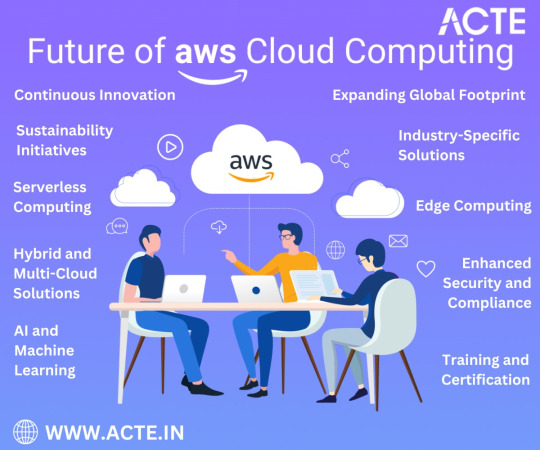
In conclusion, the future of AWS shines brightly with promise. As a expert in cloud computing, AWS remains committed to continuous innovation, global expansion, industry-specific solutions, sustainability, security, and empowering businesses with advanced technologies. For those looking to embark on a career or excel further in the realm of AWS, platforms like ACTE Technologies offer industry-aligned training and certification programs.
As businesses increasingly rely on cloud services to drive their digital transformation, AWS will continue to play a key role in reshaping industries and empowering innovation. Whether you are an aspiring cloud professional or a seasoned expert, staying ahead of AWS's evolving landscape is most important. The future of AWS is not just about technology; it's about the limitless possibilities it offers to organizations and individuals willing to embrace the cloud's transformative power.
8 notes
·
View notes
Text
Navigating the Cloud Landscape: Unleashing Amazon Web Services (AWS) Potential
In the ever-evolving tech landscape, businesses are in a constant quest for innovation, scalability, and operational optimization. Enter Amazon Web Services (AWS), a robust cloud computing juggernaut offering a versatile suite of services tailored to diverse business requirements. This blog explores the myriad applications of AWS across various sectors, providing a transformative journey through the cloud.

Harnessing Computational Agility with Amazon EC2
Central to the AWS ecosystem is Amazon EC2 (Elastic Compute Cloud), a pivotal player reshaping the cloud computing paradigm. Offering scalable virtual servers, EC2 empowers users to seamlessly run applications and manage computing resources. This adaptability enables businesses to dynamically adjust computational capacity, ensuring optimal performance and cost-effectiveness.
Redefining Storage Solutions
AWS addresses the critical need for scalable and secure storage through services such as Amazon S3 (Simple Storage Service) and Amazon EBS (Elastic Block Store). S3 acts as a dependable object storage solution for data backup, archiving, and content distribution. Meanwhile, EBS provides persistent block-level storage designed for EC2 instances, guaranteeing data integrity and accessibility.
Streamlined Database Management: Amazon RDS and DynamoDB
Database management undergoes a transformation with Amazon RDS, simplifying the setup, operation, and scaling of relational databases. Be it MySQL, PostgreSQL, or SQL Server, RDS provides a frictionless environment for managing diverse database workloads. For enthusiasts of NoSQL, Amazon DynamoDB steps in as a swift and flexible solution for document and key-value data storage.
Networking Mastery: Amazon VPC and Route 53
AWS empowers users to construct a virtual sanctuary for their resources through Amazon VPC (Virtual Private Cloud). This virtual network facilitates the launch of AWS resources within a user-defined space, enhancing security and control. Simultaneously, Amazon Route 53, a scalable DNS web service, ensures seamless routing of end-user requests to globally distributed endpoints.
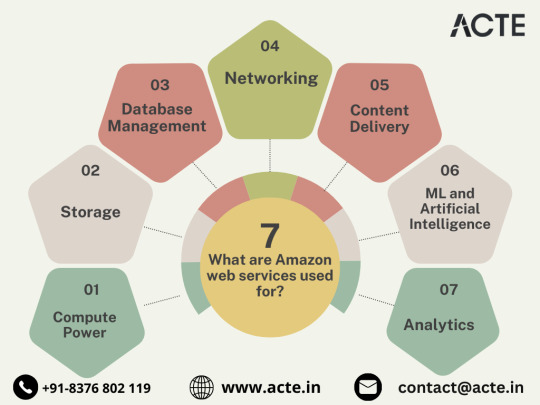
Global Content Delivery Excellence with Amazon CloudFront
Amazon CloudFront emerges as a dynamic content delivery network (CDN) service, securely delivering data, videos, applications, and APIs on a global scale. This ensures low latency and high transfer speeds, elevating user experiences across diverse geographical locations.
AI and ML Prowess Unleashed
AWS propels businesses into the future with advanced machine learning and artificial intelligence services. Amazon SageMaker, a fully managed service, enables developers to rapidly build, train, and deploy machine learning models. Additionally, Amazon Rekognition provides sophisticated image and video analysis, supporting applications in facial recognition, object detection, and content moderation.
Big Data Mastery: Amazon Redshift and Athena
For organizations grappling with massive datasets, AWS offers Amazon Redshift, a fully managed data warehouse service. It facilitates the execution of complex queries on large datasets, empowering informed decision-making. Simultaneously, Amazon Athena allows users to analyze data in Amazon S3 using standard SQL queries, unlocking invaluable insights.
In conclusion, Amazon Web Services (AWS) stands as an all-encompassing cloud computing platform, empowering businesses to innovate, scale, and optimize operations. From adaptable compute power and secure storage solutions to cutting-edge AI and ML capabilities, AWS serves as a robust foundation for organizations navigating the digital frontier. Embrace the limitless potential of cloud computing with AWS – where innovation knows no bounds.
3 notes
·
View notes
Text
The Power of AI and Human Collaboration in Media Content Analysis

In today’s world binge watching has become a way of life not just for Gen-Z but also for many baby boomers. Viewers are watching more content than ever. In particular, Over-The-Top (OTT) and Video-On-Demand (VOD) platforms provide a rich selection of content choices anytime, anywhere, and on any screen. With proliferating content volumes, media companies are facing challenges in preparing and managing their content. This is crucial to provide a high-quality viewing experience and better monetizing content.
Some of the use cases involved are,
Finding opening of credits, Intro start, Intro end, recap start, recap end and other video segments
Choosing the right spots to insert advertisements to ensure logical pause for users
Creating automated personalized trailers by getting interesting themes from videos
Identify audio and video synchronization issues
While these approaches were traditionally handled by large teams of trained human workforces, many AI based approaches have evolved such as Amazon Rekognition’s video segmentation API. AI models are getting better at addressing above mentioned use cases, but they are typically pre-trained on a different type of content and may not be accurate for your content library. So, what if we use AI enabled human in the loop approach to reduce cost and improve accuracy of video segmentation tasks.
In our approach, the AI based APIs can provide weaker labels to detect video segments and send for review to be trained human reviewers for creating picture perfect segments. The approach tremendously improves your media content understanding and helps generate ground truth to fine-tune AI models. Below is workflow of end-2-end solution,
Raw media content is uploaded to Amazon S3 cloud storage. The content may need to be preprocessed or transcoded to make it suitable for streaming platform (e.g convert to .mp4, upsample or downsample)
AWS Elemental MediaConvert transcodes file-based content into live stream assets quickly and reliably. Convert content libraries of any size for broadcast and streaming. Media files are transcoded to .mp4 format
Amazon Rekognition Video provides an API that identifies useful segments of video, such as black frames and end credits.
Objectways has developed a Video segmentation annotator custom workflow with SageMaker Ground Truth labeling service that can ingest labels from Amazon Rekognition. Optionally, you can skip step#3 if you want to create your own labels for training custom ML model or applying directly to your content.
The content may have privacy and digitial rights management requirements and protection. The Objectway’s Video Segmentaton tool also supports Digital Rights Management provider integration to ensure only authorized analyst can look at the content. Moreover, the content analysts operate out of SOC2 TYPE2 compliant facilities where no downloads or screen capture are allowed.
The media analysts at Objectways’ are experts in content understanding and video segmentation labeling for a variety of use cases. Depending on your accuracy requirements, each video can be reviewed or annotated by two independent analysts and segment time codes difference thresholds are used for weeding out human bias (e.g., out of consensus if time code differs by 5 milliseconds). The out of consensus labels can be adjudicated by senior quality analyst to provide higher quality guarantees.
The Objectways Media analyst team provides throughput and quality gurantees and continues to deliver daily throughtput depending on your business needs. The segmented content labels are then saved to Amazon S3 as JSON manifest format and can be directly ingested into your Media streaming platform.
Conclusion
Artificial intelligence (AI) has become ubiquitous in Media and Entertainment to improve content understanding to increase user engagement and also drive ad revenue. The AI enabled Human in the loop approach outlined is best of breed solution to reduce the human cost and provide highest quality. The approach can be also extended to other use cases such as content moderation, ad placement and personalized trailer generation.
Contact [email protected] for more information.
2 notes
·
View notes
Text
Scaling Your Australian Business with AI: A CEO’s Guide to Hiring Developers
In today’s fiercely competitive digital economy, innovation isn’t a luxury—it’s a necessity. Australian businesses are increasingly recognizing the transformative power of Artificial Intelligence (AI) to streamline operations, enhance customer experiences, and unlock new revenue streams. But to fully harness this potential, one crucial element is required: expert AI developers.
Whether you’re a fast-growing fintech in Sydney or a manufacturing giant in Melbourne, if you’re looking to implement scalable AI solutions, the time has come to hire AI developers who understand both the technology and your business landscape.
In this guide, we walk CEOs, CTOs, and tech leaders through the essentials of hiring AI talent to scale operations effectively and sustainably.

Why AI is Non-Negotiable for Scaling Australian Enterprises
Australia has seen a 270% rise in AI adoption across key industries like retail, healthcare, logistics, and finance over the past three years. From predictive analytics to conversational AI and intelligent automation, AI has become central to delivering scalable, data-driven solutions.
According to Deloitte Access Economics, AI is expected to contribute AU$ 22.17 billion to the Australian economy by 2030. For CEOs and decision-makers, this isn’t just a trend—it’s a wake-up call to start investing in the right AI talent to stay relevant.
The Hidden Costs of Delaying AI Hiring
Still relying on a traditional tech team to handle AI-based initiatives? You could be leaving significant ROI on the table. Without dedicated experts, your AI projects risk:
Delayed deployments
Poorly optimized models
Security vulnerabilities
Lack of scalability
Wasted infrastructure investment
By choosing to hire AI developers, you're enabling faster time-to-market, more accurate insights, and a competitive edge in your sector.
How to Hire AI Developers: A Strategic Approach for Australian CEOs
The process of hiring AI developers is unlike standard software recruitment. You’re not just hiring a coder—you’re bringing on board an innovation partner.
Here’s what to consider:
1. Define the Scope of AI in Your Business
Before hiring, map out where AI fits in your roadmap:
Are you looking for machine learning-driven forecasting?
Want to implement AI chatbots for 24/7 customer service?
Building a computer vision solution for your manufacturing line?
Once you identify the use cases, it becomes easier to hire ML developers or AI experts with the relevant domain and technical experience.
2. Understand the AI Tech Stack
A strong AI developer should be proficient in:
Python, R, TensorFlow, PyTorch
Scikit-learn, Keras, OpenCV
Data engineering with SQL, Spark, Hadoop
Deployment tools like Docker, Kubernetes, AWS SageMaker
When you hire remote AI engineers, ensure they’re fluent not just in coding, but also in AI deployment and scalability best practices.
3. Consider AI Developer Augmentation for Speed & Flexibility
Building an in-house AI team is time-consuming and expensive. That’s why AI developer staff augmentation is a smarter choice for many Australian enterprises.
With our staff augmentation services, you can:
Access pre-vetted, highly skilled AI developers
Scale up or down depending on your project phase
Save costs on infrastructure and training
Retain full control over your development process
Whether you need to hire ML developers for short-term analytics or long-term AI product development, we offer customized engagement models to suit your needs.
4. Prioritize Industry Experience
AI isn’t one-size-fits-all. Hiring developers who have experience in your specific industry—be it healthcare, fintech, ecommerce, logistics, or manufacturing—ensures faster onboarding and better results.
We’ve helped companies in Australia and across the globe integrate AI into:
Predictive maintenance systems
Smart supply chain analytics
AI-based fraud detection in banking
Personalized customer experiences in ecommerce
This hands-on experience allows our developers to deliver solutions that are relevant and ROI-driven.
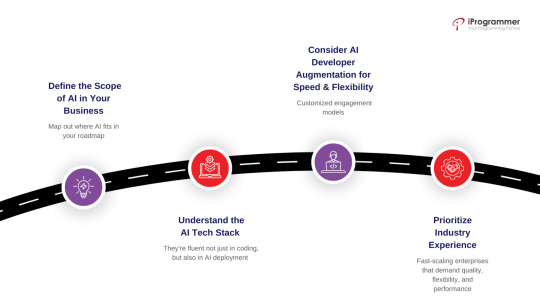
Why Choose Our AI Developer Staff Augmentation Services?
At iProgrammer, we bring over a decade of experience in empowering businesses through intelligent technology solutions. Our AI developer augmentation services are designed for fast-scaling enterprises that demand quality, flexibility, and performance.
What Sets Us Apart:
AI-First Talent Pool: We don’t generalize. We specialize in AI, ML, NLP, computer vision, and data science.
Quick Deployment: Get developers onboarded and contributing in just a few days.
Cost Efficiency: Hire remote AI developers from our offshore team and reduce development costs by up to 40%.
End-to-End Support: From hiring to integration and project execution, we stay involved to ensure success.
A Case in Point: AI Developer Success in an Australian Enterprise
One of our clients, a mid-sized logistics company in Brisbane, wanted to predict delivery delays using real-time data. Within 3 weeks of engagement, we onboarded a senior ML developer who built a predictive model using historical shipment data, weather feeds, and traffic APIs. The result? A 25% reduction in customer complaints and a 15% improvement in delivery time accuracy.
This is the power of hiring the right AI developer at the right time.
Final Thoughts: CEOs Must Act Now to Stay Ahead
If you’re a CEO, CTO, or decision-maker in Australia, the question isn’t “Should I hire AI developers?” It’s “How soon can I hire the right AI developer to scale my business?”
Whether you're launching your first AI project or scaling an existing system, AI developer staff augmentation provides the technical depth and agility you need to grow fast—without the friction of long-term hiring.
Ready to Build Your AI Dream Team?
Let’s connect. Talk to our AI staffing experts today and discover how we can help you hire remote AI developers or hire ML developers who are ready to make an impact from day one.
👉 Contact Us Now | Schedule a Free Consultation
0 notes
Text
Checklist for Hiring AI Developers in UAE: Skills, Experience, and More

Artificial Intelligence (AI) isn't just a cool talking point anymore-it's steering the latest breakthroughs in almost every field. Whether a business uses AI to tidy up customer chats, guess future sales, or serve products that feel hand-tailored, the smart tech now sits at the heart of its game plan. Right here in the UAE, companies are scrambling to find AI developers who can keep that momentum going. Yet the very hunger for talent makes it tough to spot and land the perfect candidate.
If your firm wants to Hire AI Developers in the UAE, a no-nonsense hiring checklist can save time and headaches. The step-by-step guide below shows you how to search for, assess, and smoothly onboard skilled AI pros so they stick around and push your goals forward.
Why Hiring the Right AI Developer Matters in the UAE Context?
The UAE is fast becoming the Middle East's tech capital, fueled by bold plans like the UAE 2031 AI Strategy and huge spending on smart cities, fintech, logistics, and next-gen healthcare. All that progress has sparked a turf war for AI brains, and only companies with a sharp hiring process will grab the talent they need.
Bringing a poor developer on board can mean late projects, weak AI results, and money down the drain. In contrast, the right person adds solid tech skills, real-world know-how, and the know-how to grow your AI solution with your market.
The Ultimate Checklist for Hiring AI Developers in UAE:
Here is a no-nonsense list of traits and skills to seek when bringing AI developers into your UAE team.
1. Foundational Technical Skills
Before you look at years worked or shiny badges, confirm that any candidate masters the basics of AI and machine learning. Key skills include:
Programming Languages: Python rules the field; know-how in R, Java, or C++ is a plus.
Data Structures & Algorithms: These keep the code clean and fast.
Math & Statistics: Solid grasp of linear algebra, calculus, and probability fuels good models.
Libraries & Frameworks: Experience with TensorFlow, PyTorch, or Scikit-learn must match your project.
Cloud Services: Comfort with AWS (SageMaker), Google Cloud AI, or Azure Machine Learning is vital.
A sturdy foundation lets developers craft reliable models today and pivot to tomorrows tools with ease.
2. Real-World Project Work
Talent you spot on a resume don't always deliver results. If you plan to hire AI developers in the UAE, put genuine project work at the top of your checklist. Ask them for:
A clean portfolio or up-to-date GitHub page
Samples of apps that run on AI tech
Brief case studies that detail how their system solved a problem
Work with live data streams and APIs
Positions where they led AI roll-outs in retail, healthcare, logistics or fintech
Extra credit goes to anyone who tackled UAE challenges-arabic NLP, e-commerce trends in the region, or smart-city links.
3. Solid Know-How of UAE Rules and Data Law
AI doesn't run in a legal vacuum. Your developers need clear know-how of UAE data laws and compliance hot spots, including:
Health data (think DHA and MOH rules)
Finance work (see Central Bank cyber standards)
Cross-border transfers and GDPR ties when overseas clients appear
Bringing on team members who get the local rules cuts risk and keeps your AI tools ethical and by the book.
4. Soft Skills and Communication
Building AI systems is nearly never a one-person show. Coders team up with data pros, product leads, and now and then the end-users themselves. Because of that, soft skills matter just as much as coding chops:
Writing and talking about tech in everyday language
Hopping smoothly between different team roles
Seeing problems as puzzles to solve, not roadblocks
Keeping cool when project plans change overnight
In the hectic, mix-of-cultures UAE market, good people skills can set a project on fire-or keep it from burning down.
5. Domain Knowledge
When AI builders know the business inside and out, ideas turn into value much faster. Think of the shortcuts they can take:
In retail: customer tags, better product suggestions
In healthcare: clearer scans, smarter diagnosis tips
In real estate: sharper price models, hot lead scoring
In logistics: quicker routes, spot-on demand forecasts
So, whether your office sits in Dubai, Abu Dhabi, or Sharjah, looking for developers with real-world know-how keeps your AI work on-target and ready to make money.
6. Experience with Edge Technologies and Integrations
AI usually works best when teamed up with other smart tools. Developers who grasp these pairings stand out:
IoT plus Edge AI for next-gen smart city sensors.
NLP that runs in many languages on customer service chatbots.
Computer vision for spotting theft or tracking store traffic.
RPA that zips through internal tasks without human clicks.
In the UAEs fast-growing innovation hubs, cross-trained devs are already ticketed for top projects.
7. Understanding of AI Ethics and Bias Mitigation
Poorly managed AI can echo old biases and cause real harm. Great developers stay alert to:
Fairness, openness, and clear lines of responsibility.
Skewed data that trains models to make one-sided calls.
How automated choices affect different cultures and communities.
Bringing on teammates who place ethics first is vital in the UAEs diverse landscape.
Cultural Fit and Work Ethic
Hiring on-paper skill alone won't keep an AI team productive. Look for engineers who:
Share your company mission
Respect deadlines
Crave new knowledge and tools
Can keep pace with the UAE's rapid tech scene
Whether you're a Dubai Internet City startup or an Abu Dhabi agency, the right fit keeps your AI unit healthy.
References and Client Testimonials
Always ask past bosses or clients for stories. These checks show:
Projects were finished on time
The developers communication clicked
Problems were untangled independently
They acted with integrity and professionalism
If you can, call firms that tackled similar UAE projects so you know what to expect.
Willingness to Sign NDAs and IP Agreements
AI work often touches secret data and unique code. Confirm that the developer will sign:
Non-disclosure agreements (NDAs)
Intellectual property (IP) transfer terms
Work-for-hire documents
Guarding your intellectual assets is crucial in crowded fields like fintech or e-commerce, where AI can set you apart.
Where to Find and Hire Top AI Developers in the UAE?
Now that you know what to look for, where can you actually hire AI developers in the UAE?
Here are a few trusted routes:
Specialized AI shops like WDCS Technology that provide pre-screened talent ready to start.
Innovation hubs and incubators such as Dubai Future Foundation or Abu Dhabi's Hub71.
Freelance boards like Upwork, Toptal, or LinkedIn-be sure to check for local experience.
Engineering schools including Khalifa University and Heriot-Watt, both churning out AI grads.
Working with local devs or UAE-based teams usually means smoother talk, faster contracts, and a team that gets the local market.
Red Flags to Avoid While Hiring
Even with a good checklist, bad hires still sneak in. Stay alert if a candidate:
Has no live portfolio, GitHub, or public code example to show.
Won't take a short coding test or demo session.
Struggles to explain what they actually did on past projects.
Dodges questions about ethics, data privacy, or bias.
Leans too much on ChatGPT or no-code tools instead of real logic.
Remember, you are hiring a problem-tackler, not just a keyboard-thumping coder.
Final Thoughts
The United Arab Emirates is steering ahead with digital change, and artificial intelligence is riding shotgun. Even so, any AI project will only thrive when talented, curious people are the ones building it. Work through the checklist above, and you can hire UAE AI developers who fit both the code and the company culture.
Whether you plan to launch a smart app, streamline tasks, or turn raw data into clear choices,C bringing in the right minds isthecrucialfirstmove.
Ready to Hire the Right AI Talent in the UAE?
If you're set to speed up your AI plan, work with a name you can trust in the UAE. WDCS Technology links you to top-tier AI engineers, clear action plans, and deep local insight. Well craft systems that are fast, dependable, and built on solid ethical ground.
Contact us today and start hiring developers who turn ideas into real results.
0 notes
Link
0 notes
Text
🎓 Machine Learning On Amazon Certification – Get Globally Certified by EdChart
✨ Want to stand out as a Machine Learning professional? EdChart is thrilled to launch the Machine Learning On Amazon Certification — an industry-validated, globally recognized online exam that rewards your skills without needing a single class.

✅ 100% Online ✅ No Training Required ✅ Pay After You Pass ✅ Digital Badge from Credly
This certification is a career accelerator for developers, data professionals, AI freelancers, and students aiming to step confidently into Amazon’s machine learning ecosystem.
🔍 What You’ll Be Certified For
Machine learning workflows using Amazon SageMaker
Model training, deployment & optimization on AWS
Batch & real-time inference techniques
Data pipeline integration for scalable ML solutions
End-to-end ML lifecycle in Amazon cloud environments
💡 Why This Certification Is a Game-Changer
🚀 No upfront cost – Pay only after passing
🎓 Globally accepted credential from Credly
💼 Boost your LinkedIn, Freelance Profile, or Resume
💥 Perfect for freelancers, job seekers, remote techies & students
🔗 Important Links
👉 Start Your Machine Learning On Amazon Certification 👉 Verify Your Credly Badge
✅ Who Is This For?
🔧 Freelancers looking to showcase verified ML skills
🧠 Students aiming for AI internships or job roles
💻 Developers transitioning to ML-based careers
🌐 Remote professionals working in global projects
#MachineLearningOnAmazonCertification #AWSML #EdChart #AIJobs #FreelanceTech #OnlineCertification #PayAfterYouPass #MachineLearning #CredlyBadge #TechCareers #MLDevelopers
#students#technology#artificial intelligence#education#ai#aicertification#edchart#globalcertification#artificialintelligence#futureofwork
0 notes
Text
Hire Best AWS Sagemaker Developer
At SoftmaxAI, we provide custom AWS cloud consulting services to help your business grow. Our AWS sagemaker developer assists you automate software release processes and focus on building and delivering applications and services more efficiently. Hire the best AWS sagemaker developer today!
0 notes
Text
Amazon Braket SDK Architecture And Components Explained
A comprehensive framework that abstracts the complexity of quantum hardware and simulators, Amazon Braket SDK is gradually becoming a major tool for quantum computing. It aims to give developers a consistent interface for using a variety of quantum resources and inspire creativity in the fast-growing field of quantum computing. Its multilayered construction.
SDK Architecture Amazon Braket
Abstraction for Comfort and Flexibility The SDK's core is its powerful device abstraction layer. This vital portion provides a single interface to Oxford Quantum Circuits, IonQ, Rigetti, and Xanadu quantum backends as well as simulators. This layer largely safeguards developers from understanding quantum processor details by turning user-defined quantum circuits into backend-specific instruction sets and protocols.
Quantum programs are portable and interoperable thanks to standardised quantum circuit representations and backend-specific adapters. Quantum computing is dynamic, therefore its modular architecture lets you add new backends without disrupting the core functionality. The main quantum development modules are: Braket.circuits: Hub Quantum Circuit The Braket SDK's main module, braket.circuits, offers comprehensive tools for building, altering, and refining quantum circuits. This module's DAG model of quantum circuits permits complicated optimisations like subexpression elimination and gate cancellation. Ability to construct bespoke gates and allow many quantum gate sets provides it versatility. Quantum computing frameworks like PennyLane and Qiskit allow developers to use current tools and knowledge. Compatible quantum computing platforms benefit from OpenQASM compliance. Braket.jobs: Management of Quantum Execution Braket.jobs controls quantum circuits on simulators and hardware. It tracks the Braket service's job submission process and receives results. This module is crucial for error handling, prioritisation, and job queue management. Developers can customise the execution environment by setting parameters like shots, random number seed, and experiment duration. The module supports synchronous and asynchronous execution, so developers can choose the right one. It also tracks resource use and cost to optimise quantum processes. Braket.devices: Hardware Optimisation and Access The braket.devices module is essential for accessing quantum processors and simulators. Developers can query qubit count, connection, and gate integrity. This module gives methods for selecting the optimum equipment for a task based on cost and performance. A device profile system that uniformly describes each device's capabilities allows the SDK to automatically optimise quantum circuits for the chosen device, enhancing efficiency and reducing errors. Device characterisation and calibration are also possible with the module, ensuring peak efficiency.
Amazon Braket SDK Parts
Smooth Amazon S3 Integration: The SDK's seamless interface with Amazon S3, a scalable and affordable storage alternative, is key to its architecture. Quantum circuits are usually saved in S3 as JSON files for easy sharing and version management. A persistent calculation record is established by saving job results in S3. The SDK's S3 APIs simplify data analysis and visualisation. The SDK can use AWS Lambda and Amazon SageMaker using this interface to construct more complex quantum applications. A Solid Error Mitigation Framework: Due to quantum hardware noise and defects, the Amazon Braket SDK includes a robust error mitigation system. This framework includes crucial error detection, correction, and noise characterisation algorithms. These procedures can be set up and implemented using SDK APIs, allowing developers to customise error mitigation. It helps developers improve their error mitigation strategy with tools to analyse approaches. As methods and algorithms become available, the framework will be updated. Security for Enterprises with AWS IAM Enterprise-grade security is possible with AWS IAM. The SDK's architecture relies on AWS IAM, making security crucial. IAM's fine-grained access control lets developers set policies that restrict quantum resource access to users and programs. Data in transit and at rest is encrypted by the SDK to prevent unauthorised access to sensitive quantum data. The SDK protects quantum data and meets enterprise clients' high security standards. Connects to AWS CloudTrail and GuardDuty for complete security monitoring and auditing. In conclusion
The Amazon Braket SDK provides a customised, secure quantum computing framework. Abstraction of hardware difficulties, powerful circuit design and execution tools, integration with scalable AWS services, and prioritisation of security and error prevention lower the barrier to entry, allowing developers to fully explore quantum computing's possibilities.
#AmazonBraketSDK#SDKArchitecture#IonQ#QuantumCircuitHub#AmazonS3#AWSLambda#AmazonSageMaker#News#Technews#Technology#Technologynews#Technologytrends#Govindhtech
0 notes
Text
AWS Security 101: Protecting Your Cloud Investments
In the ever-evolving landscape of technology, few names resonate as strongly as Amazon.com. This global giant, known for its e-commerce prowess, has a lesser-known but equally influential arm: Amazon Web Services (AWS). AWS is a powerhouse in the world of cloud computing, offering a vast and sophisticated array of services and products. In this comprehensive guide, we'll embark on a journey to explore the facets and features of AWS that make it a driving force for individuals, companies, and organizations seeking to utilise cloud computing to its fullest capacity.

Amazon Web Services (AWS): A Technological Titan
At its core, AWS is a cloud computing platform that empowers users to create, deploy, and manage applications and infrastructure with unparalleled scalability, flexibility, and cost-effectiveness. It's not just a platform; it's a digital transformation enabler. Let's dive deeper into some of the key components and features that define AWS:
1. Compute Services: The Heart of Scalability
AWS boasts services like Amazon EC2 (Elastic Compute Cloud), a scalable virtual server solution, and AWS Lambda for serverless computing. These services provide users with the capability to efficiently run applications and workloads with precision and ease. Whether you need to host a simple website or power a complex data-processing application, AWS's compute services have you covered.
2. Storage Services: Your Data's Secure Haven
In the age of data, storage is paramount. AWS offers a diverse set of storage options. Amazon S3 (Simple Storage Service) caters to scalable object storage needs, while Amazon EBS (Elastic Block Store) is ideal for block storage requirements. For archival purposes, Amazon Glacier is the go-to solution. This comprehensive array of storage choices ensures that diverse storage needs are met, and your data is stored securely.
3. Database Services: Managing Complexity with Ease
AWS provides managed database services that simplify the complexity of database management. Amazon RDS (Relational Database Service) is perfect for relational databases, while Amazon DynamoDB offers a seamless solution for NoSQL databases. Amazon Redshift, on the other hand, caters to data warehousing needs. These services take the headache out of database administration, allowing you to focus on innovation.
4. Networking Services: Building Strong Connections
Network isolation and robust networking capabilities are made easy with Amazon VPC (Virtual Private Cloud). AWS Direct Connect facilitates dedicated network connections, and Amazon Route 53 takes care of DNS services, ensuring that your network needs are comprehensively addressed. In an era where connectivity is king, AWS's networking services rule the realm.
5. Security and Identity: Fortifying the Digital Fortress
In a world where data security is non-negotiable, AWS prioritizes security with services like AWS IAM (Identity and Access Management) for access control and AWS KMS (Key Management Service) for encryption key management. Your data remains fortified, and access is strictly controlled, giving you peace of mind in the digital age.
6. Analytics and Machine Learning: Unleashing the Power of Data
In the era of big data and machine learning, AWS is at the forefront. Services like Amazon EMR (Elastic MapReduce) handle big data processing, while Amazon SageMaker provides the tools for developing and training machine learning models. Your data becomes a strategic asset, and innovation knows no bounds.
7. Application Integration: Seamlessness in Action
AWS fosters seamless application integration with services like Amazon SQS (Simple Queue Service) for message queuing and Amazon SNS (Simple Notification Service) for event-driven communication. Your applications work together harmoniously, creating a cohesive digital ecosystem.
8. Developer Tools: Powering Innovation
AWS equips developers with a suite of powerful tools, including AWS CodeDeploy, AWS CodeCommit, and AWS CodeBuild. These tools simplify software development and deployment processes, allowing your teams to focus on innovation and productivity.
9. Management and Monitoring: Streamlined Resource Control
Effective resource management and monitoring are facilitated by AWS CloudWatch for monitoring and AWS CloudFormation for infrastructure as code (IaC) management. Managing your cloud resources becomes a streamlined and efficient process, reducing operational overhead.
10. Global Reach: Empowering Global Presence
With data centers, known as Availability Zones, scattered across multiple regions worldwide, AWS enables users to deploy applications close to end-users. This results in optimal performance and latency, crucial for global digital operations.
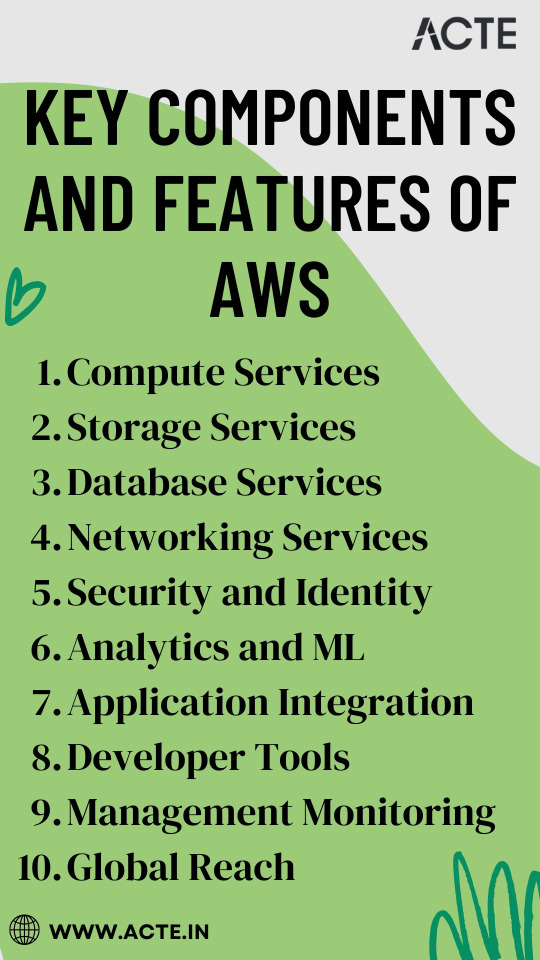
In conclusion, Amazon Web Services (AWS) is not just a cloud computing platform; it's a technological titan that empowers organizations and individuals to harness the full potential of cloud computing. Whether you're an aspiring IT professional looking to build a career in the cloud or a seasoned expert seeking to sharpen your skills, understanding AWS is paramount.
In today's technology-driven landscape, AWS expertise opens doors to endless opportunities. At ACTE Institute, we recognize the transformative power of AWS, and we offer comprehensive training programs to help individuals and organizations master the AWS platform. We are your trusted partner on the journey of continuous learning and professional growth. Embrace AWS, embark on a path of limitless possibilities in the world of technology, and let ACTE Institute be your guiding light. Your potential awaits, and together, we can reach new heights in the ever-evolving world of cloud computing. Welcome to the AWS Advantage, and let's explore the boundless horizons of technology together!
8 notes
·
View notes
Text
Navigating the Cloud: Unleashing Amazon Web Services' (AWS) Impact on Digital Transformation
In the ever-evolving realm of technology, cloud computing stands as a transformative force, offering unparalleled flexibility, scalability, and cost-effectiveness. At the forefront of this paradigm shift is Amazon Web Services (AWS), a comprehensive cloud computing platform provided by Amazon.com. For those eager to elevate their proficiency in AWS, specialized training initiatives like AWS Training in Pune offer invaluable insights into maximizing the potential of AWS services.

Exploring AWS: A Catalyst for Digital Transformation
As we traverse the dynamic landscape of cloud computing, AWS emerges as a pivotal player, empowering businesses, individuals, and organizations to fully embrace the capabilities of the cloud. Let's delve into the multifaceted ways in which AWS is reshaping the digital landscape and providing a robust foundation for innovation.
Decoding the Heart of AWS
AWS in a Nutshell: Amazon Web Services serves as a robust cloud computing platform, delivering a diverse range of scalable and cost-effective services. Tailored to meet the needs of individual users and large enterprises alike, AWS acts as a gateway, unlocking the potential of the cloud for various applications.
Core Function of AWS: At its essence, AWS is designed to offer on-demand computing resources over the internet. This revolutionary approach eliminates the need for substantial upfront investments in hardware and infrastructure, providing users with seamless access to a myriad of services.
AWS Toolkit: Key Services Redefined
Empowering Scalable Computing: Through Elastic Compute Cloud (EC2) instances, AWS furnishes virtual servers, enabling users to dynamically scale computing resources based on demand. This adaptability is paramount for handling fluctuating workloads without the constraints of physical hardware.
Versatile Storage Solutions: AWS presents a spectrum of storage options, such as Amazon Simple Storage Service (S3) for object storage, Amazon Elastic Block Store (EBS) for block storage, and Amazon Glacier for long-term archival. These services deliver robust and scalable solutions to address diverse data storage needs.
Streamlining Database Services: Managed database services like Amazon Relational Database Service (RDS) and Amazon DynamoDB (NoSQL database) streamline efficient data storage and retrieval. AWS simplifies the intricacies of database management, ensuring both reliability and performance.
AI and Machine Learning Prowess: AWS empowers users with machine learning services, exemplified by Amazon SageMaker. This facilitates the seamless development, training, and deployment of machine learning models, opening new avenues for businesses integrating artificial intelligence into their applications. To master AWS intricacies, individuals can leverage the Best AWS Online Training for comprehensive insights.
In-Depth Analytics: Amazon Redshift and Amazon Athena play pivotal roles in analyzing vast datasets and extracting valuable insights. These services empower businesses to make informed, data-driven decisions, fostering innovation and sustainable growth.
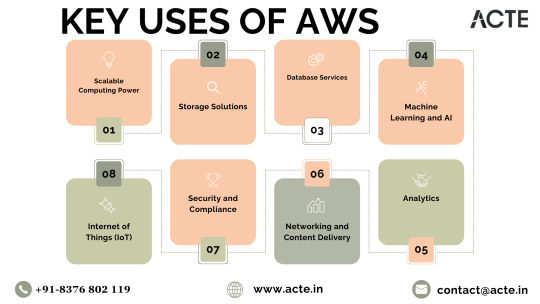
Networking and Content Delivery Excellence: AWS services, such as Amazon Virtual Private Cloud (VPC) for network isolation and Amazon CloudFront for content delivery, ensure low-latency access to resources. These features enhance the overall user experience in the digital realm.
Commitment to Security and Compliance: With an unwavering emphasis on security, AWS provides a comprehensive suite of services and features to fortify the protection of applications and data. Furthermore, AWS aligns with various industry standards and certifications, instilling confidence in users regarding data protection.
Championing the Internet of Things (IoT): AWS IoT services empower users to seamlessly connect and manage IoT devices, collect and analyze data, and implement IoT applications. This aligns seamlessly with the burgeoning trend of interconnected devices and the escalating importance of IoT across various industries.
Closing Thoughts: AWS, the Catalyst for Transformation
In conclusion, Amazon Web Services stands as a pioneering force, reshaping how businesses and individuals harness the power of the cloud. By providing a dynamic, scalable, and cost-effective infrastructure, AWS empowers users to redirect their focus towards innovation, unburdened by the complexities of managing hardware and infrastructure. As technology advances, AWS remains a stalwart, propelling diverse industries into a future brimming with endless possibilities. The journey into the cloud with AWS signifies more than just migration; it's a profound transformation, unlocking novel potentials and propelling organizations toward an era of perpetual innovation.
2 notes
·
View notes
Text
How Cloud Computing Is Shaping the Future of Data Science
In today’s digital era, data is being generated at an unprecedented rate, and processing this data efficiently has become a priority for businesses. In this space, cloud computing has transformed the way data is stored, processed, and analyzed. For anyone aspiring to thrive in this dynamic field, enrolling in the best data science training in Hyderabad is a crucial step toward gaining the necessary skills.
Scalability and Cost-Effectiveness
There are many other advantages to cloud computing, apart from its scalability. Data scientists can scale computing resources up or down based on project needs, without the burden of maintaining expensive infrastructure. This flexibility allows for faster experimentation and quicker deployment of data models.
Real-Time Collaboration and Remote Access
With cloud platforms, teams can collaborate from anywhere in the world.Tools like Google Colab, AWS Sagemaker, and Azure Machine Learning allow multiple users to develop, train, and deploy models in real-time—boosting efficiency and innovation.
Integration with AI and Big Data Tools
Cloud computing supports seamless integration with cutting-edge tools used in machine learning, artificial intelligence, and big data analytics. Platforms offer built-in APIs and services that accelerate development, automate workflows, and streamline data pipelines, making them ideal for modern data science projects.
Conclusion: Future-Proof Your Career
Cloud computing is not just a support tool—it's now a foundation of modern data science. As businesses increasingly adopt cloud-first strategies, data scientists with cloud expertise will be in high demand. To build a successful and future-proof career in this domain, quality training is essential. SSSIT Computer Education offers industry-aligned, practical data science training that prepares you for real-world challenges. Join us and take the first step toward becoming a cloud-savvy data science professional.
#best data science training in hyderabad#best data science training in kukatpally#best data science training in KPHB#Best data science training institute in Hyderabad
0 notes
Text
Enterprise Artificial Intelligence: The Future of Business, or Just a Fancy Fad to 2032?
The Enterprise Artificial Intelligence Market Size was valued at USD 19.4 Billion in 2023. It is expected to grow to USD 284.9 Billion by 2032 and grow at a CAGR of 34.8% over the forecast period of 2024-2032.
The global Enterprise Artificial Intelligence (AI) Market is on the cusp of unprecedented expansion, poised to skyrocket from an estimated USD 19.4 billion in 2023 to a staggering USD 284.9 billion by 2032. This represents an astounding Compound Annual Growth Rate (CAGR) of 34.8% over the forecast period of 2024-2032. This rapid growth is a clear indicator of the increasing recognition among businesses of AI's transformative power in enhancing operational efficiency, driving innovation, and building resilient, future-ready organizations.
Enterprise Artificial Intelligence Market Set for U.S Explosive Growth, Driven by Digital Transformation and Operational Imperatives
The monumental growth trajectory of the Enterprise Artificial Intelligence market signifies a fundamental paradigm shift in how businesses operate. AI is no longer a futuristic concept but a tangible, strategic asset that is reshaping industries by automating complex tasks, generating critical insights from vast datasets, and revolutionizing customer interactions. This pervasive adoption is driven by the urgent need for enterprises to optimize resource allocation, mitigate risks, and unlock new avenues for growth in an increasingly competitive and data-intensive global economy. The robust investment and widespread implementation of AI are cementing its role as an indispensable component of modern business strategy.
Get Sample Copy of This Report: https://www.snsinsider.com/sample-request/3119
Market Keyplayers:
SAP SE (SAP AI Core, SAP Leonardo)
DataRobot, Inc. (DataRobot Automated Machine Learning, DataRobot MLOps)
Microsoft Corporation (Azure AI, Microsoft Cognitive Services)
Oracle Corporation (Oracle AI, Oracle Digital Assistant)
NVidia Corporation (NVIDIA AI Enterprise, NVIDIA Clara)
Amazon Web Services, Inc. (AWS) (AWS SageMaker, AWS Rekognition)
Intel Corporation (Intel OpenVINO, Intel Xeon Scalable Processors with AI)
Hewlett Packard Enterprise (HPE Ezmeral Machine Learning Ops, HPE GreenLake for AI)
IBM Corporation (IBM Watson, IBM Cloud Pak for Data)
Alphabet Inc. (Google) (Google Cloud AI, TensorFlow)
C3.ai, Inc. (C3 AI Suite, C3 AI CRM)
Wipro Limited (Wipro HOLMES, Wipro AI Studio)
Apple Inc. (Core ML, Siri Intelligence)
IPsoft Inc. (Amelia, 1Desk)
Salesforce, Inc. (Salesforce Einstein, Tableau AI)
Adobe Inc. (Adobe Sensei, Adobe Experience Platform AI)
ServiceNow, Inc. (Now Intelligence, Predictive Intelligence)
SAP HANA Cloud Services (SAP HANA Cloud, SAP Business AI)
Zoho Corporation (Zia, Zoho Analytics AI)
Alibaba Cloud (ET Brain, Alibaba AI Platform)
Market Analysis
Growing Data Volumes and Complexity: The exponential increase in enterprise data necessitates AI-powered solutions for efficient processing, analysis, and extraction of actionable insights.
Demand for Automation and Efficiency: Businesses are heavily investing in AI to automate repetitive tasks, streamline workflows, reduce operational costs, and improve overall productivity across various functions.
Enhanced Decision-Making and Predictive Capabilities: AI provides advanced analytics and predictive modeling, enabling organizations to make more informed, data-driven decisions and anticipate future trends.
Market Trends
Generative AI and Large Language Models (LLMs): The widespread adoption and commoditization of generative AI, particularly LLMs, are transforming creative processes, content generation, and customer service applications across enterprises.
Responsible AI (RAI) and Governance: As AI becomes more integrated, there's a growing emphasis on developing and implementing ethical AI frameworks, ensuring transparency, fairness, and accountability in AI systems to address societal and regulatory concerns.
Market Scope
The Enterprise Artificial Intelligence market encompasses a comprehensive suite of AI technologies, applications, and services designed to empower businesses across diverse sectors. This includes:
Core Technologies: Machine Learning (ML), Natural Language Processing (NLP), Computer Vision, Deep Learning, and Predictive Analytics.
Solutions and Platforms: AI-powered software solutions for various business functions such as customer service, marketing, finance, HR, cybersecurity, and supply chain optimization.
Services: Professional services including AI consulting, implementation, integration, and managed services to support enterprises in their AI adoption journey.
Deployment Models: Both cloud-based and on-premise deployments, with cloud solutions gaining significant traction due to their scalability, flexibility, and cost-effectiveness.
Key Industries: BFSI (Banking, Financial Services, and Insurance), Healthcare, Retail, Manufacturing, IT & Telecommunications, Automotive, and Government.
Forecast Outlook
The future of the Enterprise Artificial Intelligence market is set to be characterized by relentless innovation and profound integration across all facets of business operations. As AI technologies become more sophisticated, accessible, and specialized, they will fuel unprecedented levels of automation, intelligence, and personalized engagement. The coming years will witness enterprises leveraging AI not just for efficiency gains, but as a core driver of strategic differentiation, enabling them to anticipate market shifts, foster deeper customer relationships, and sustain a competitive edge in an increasingly intelligent and interconnected global landscape.
Access Complete Report: https://www.snsinsider.com/reports/enterprise-artificial-intelligence-market-3119
Conclusion
The projected growth of the Enterprise Artificial Intelligence market to USD 284.9 billion by 2032 underscores its pivotal role in shaping the future of business. In an era defined by data proliferation and the demand for operational excellence, AI offers an unparalleled opportunity for enterprises to optimize performance, innovate at scale, and build unprecedented resilience.
Related Reports:
USA leads the way in Call Center AI innovation with smarter, faster customer support
U.S.A. leads the charge in revolutionizing IT management with AI-powered operations platforms
About Us:
SNS Insider is one of the leading market research and consulting agencies that dominates the market research industry globally. Our company's aim is to give clients the knowledge they require in order to function in changing circumstances. In order to give you current, accurate market data, consumer insights, and opinions so that you can make decisions with confidence, we employ a variety of techniques, including surveys, video talks, and focus groups around the world.
Contact Us:
Jagney Dave - Vice President of Client Engagement
Phone: +1-315 636 4242 (US) | +44- 20 3290 5010 (UK)
#Enterprise Artificial Intelligence market#Enterprise Artificial Intelligence market Scope#Enterprise Artificial Intelligence market Growth#Enterprise Artificial Intelligence market Share
0 notes